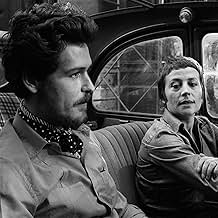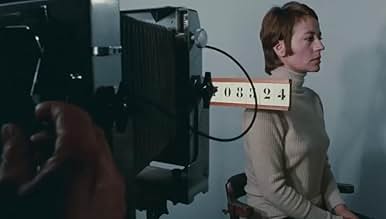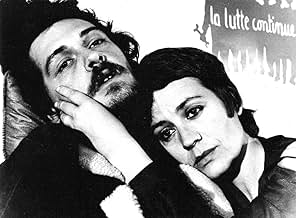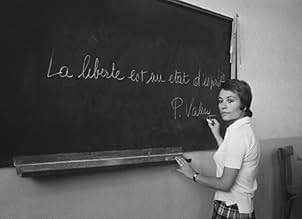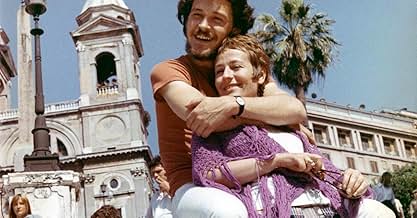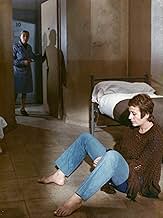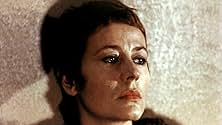अपनी भाषा में प्लॉट जोड़ेंRouen, France, 1968: Danièle is an unconventional French teacher. Every morning she takes her pupil Gérard to school. He flirts with her and she reciprocates his affection. This brings the p... सभी पढ़ेंRouen, France, 1968: Danièle is an unconventional French teacher. Every morning she takes her pupil Gérard to school. He flirts with her and she reciprocates his affection. This brings the parents and the school authorities onto the scene.Rouen, France, 1968: Danièle is an unconventional French teacher. Every morning she takes her pupil Gérard to school. He flirts with her and she reciprocates his affection. This brings the parents and the school authorities onto the scene.
- निर्देशक
- लेखक
- स्टार
- पुरस्कार
- 2 कुल नामांकन
Marcelle Ranson-Hervé
- Madame Jaias - la voisine
- (as Marcelle Ranson)
Marianik Revillon
- Cécile
- (as Mariannik Revillon)
फ़ीचर्ड समीक्षाएं
Note that a number of female American high school teachers have been sent to jail for what we are asked to view as a touching love story here. And in fact so many French viewers seem to regard it. For many American viewers, I think it will be hard, today, to view it with such equanamity, even if the (legally) victim here looks beyond his years (and apparently did in the real life case). But then I've met several girls from thirteen to fifteen who looked to be twenty - try making a film about a male teacher having an affair with one of THEM. Basically, if you want to understand why so many French intellectuals think Polanski's rape of a thirteen year old was no big deal, this film will give you some insight. Beyond that, it's a very dry style of filmmmaking, where the strongest passion on all sides seems to be anger. Supposedly these two can't keep away from each other, but there is zero sensuality in their interactions; they seem far more interested in talking about their persecuters than in each other's bodies (meanwhile, one lesbian scene makes it clear the filmmaker is not shy about naked bodies). It's also surprising to suddenly see the teacher concerned about losing custody of her children, whom we never see until late in the film and who don't seem in the least to concern her until legal stirrings raise the issue. When her ex-husband suddenly appears, it is downright jarring. Emotionally, the most powerful moments are with others, not between the two protaganists. Which is to say even if I didn't have moral reservations about the whole premise, I think I'd have trouble caring very much about the main character.
More than 50 years have passed since the film 'Mourir d'aimer' was made and released on screen, one of the blockbusters of French cinema in 1971. Watching or rewatching it today is a good opportunity to appreciate how approaches have changed since - both cinematic, but also legally and mentally - about relationships between people separated by significant age differences, but also to what extent many things remained the same, or could be judged more severely in our times of political correctness. André Cayatte, the film's director and co-writer, a lawyer by training, also a writer and a journalist, had a passion for bringing to the screens interesting and complex cases that had passed in one form or another through the French justice system. Although the film begins with a confusing disclaimer that denies resemblance to real characters, 'Mourir d'aimer' is based on a true love story between a high school teacher and her student, who had made a sensation three years before, in the tumultuous year of 1968. The screen version of this story is interesting and the film is worth watching, both as a legal and moral document, but also for its consistent artistic qualities.
This movie has one of the most beautiful movie or book titles I know of: 'Mourir d'aimer' means 'to die of love'. However, the love story, which provides the emotional motivation for this case, is almost completely neglected. I think this was intentional. Writing the screenplay for the film, Cayatte almost completely avoided the romantic aspect in favor of a realistic rendering of the explosive social environment before and during the events of May 1968, including the joint involvement of teachers and students in protest movements against the system. What followed is thus presented as a kind of violent reaction or even retaliation by the system against the protesters. This would be a pretty interesting plot by itself, but the love story, with all its beauty and its controversies is almost completely ignored at first, and presented with short and superficial scenes later. The choice of actors also contributes to this feeling. Annie Girardot plays the role of the politically-involved teacher, who is also a beautiful, divorced woman with two children, finely describing the phases of her personal attitude - from the safe-confidence of the woman who knows her rights, to the revolt against the oppressive system, and at last the despair of defeat. However, the reasons why the heroine overcomes moral and professional taboos and transforms the teacher-student relationship into what should be a stormy and tragic love story remain unclear. The role of her student and boyfriend is played by Bruno Pradal, an actor launched by this film and whose career was tragically cut by a car accident, but who does not have the charm and charisma to emotionally justify, on screen, the relationship between the two.
We are left with that part of the story that fits perfectly with André Cayatte - the judicial mechanism set in motion by the boy's parents' complaint, the criminal complicity of the various components of the system, starting with the hypocrisy of the teaching staff, going through psychiatric examinations and abusive hospitalizations, to the rigidity of the judicial system. The bright counterpoint is provided by the group of high school students, the generation raised in the atmosphere of the 1968 protest movements, which would largely change French society in the coming decades. From a contemporary perspective, however, we cannot but ask ourselves how such a case would be judged socially and in the media today. 'Mourir d'aimer' is a tragic love story set on an interesting historical background, a film in which the background image is clearer than the silhouettes of the foreground lovers.
This movie has one of the most beautiful movie or book titles I know of: 'Mourir d'aimer' means 'to die of love'. However, the love story, which provides the emotional motivation for this case, is almost completely neglected. I think this was intentional. Writing the screenplay for the film, Cayatte almost completely avoided the romantic aspect in favor of a realistic rendering of the explosive social environment before and during the events of May 1968, including the joint involvement of teachers and students in protest movements against the system. What followed is thus presented as a kind of violent reaction or even retaliation by the system against the protesters. This would be a pretty interesting plot by itself, but the love story, with all its beauty and its controversies is almost completely ignored at first, and presented with short and superficial scenes later. The choice of actors also contributes to this feeling. Annie Girardot plays the role of the politically-involved teacher, who is also a beautiful, divorced woman with two children, finely describing the phases of her personal attitude - from the safe-confidence of the woman who knows her rights, to the revolt against the oppressive system, and at last the despair of defeat. However, the reasons why the heroine overcomes moral and professional taboos and transforms the teacher-student relationship into what should be a stormy and tragic love story remain unclear. The role of her student and boyfriend is played by Bruno Pradal, an actor launched by this film and whose career was tragically cut by a car accident, but who does not have the charm and charisma to emotionally justify, on screen, the relationship between the two.
We are left with that part of the story that fits perfectly with André Cayatte - the judicial mechanism set in motion by the boy's parents' complaint, the criminal complicity of the various components of the system, starting with the hypocrisy of the teaching staff, going through psychiatric examinations and abusive hospitalizations, to the rigidity of the judicial system. The bright counterpoint is provided by the group of high school students, the generation raised in the atmosphere of the 1968 protest movements, which would largely change French society in the coming decades. From a contemporary perspective, however, we cannot but ask ourselves how such a case would be judged socially and in the media today. 'Mourir d'aimer' is a tragic love story set on an interesting historical background, a film in which the background image is clearer than the silhouettes of the foreground lovers.
N the 20th century - there were major events the World War 1, and World war 2 and the Black Movements of 1960s that gave Black people to travel in a bus and the most liberating of all was the GYPSY Trend - the Beatles, and everyone was getting liberated about SEX
Youth were breaking the barriers of social norms
There were - people smoking drugs and seeking salvation
Those were the times of Osho and Iskcon - Hare Rama Hare Krishna
In such times of 1960 - those are growing in that era - it must be really nostalgic
Compared that today's being FREE and LIBERATION is a big FARCE of fad and imitation
But in such times of 1960s - in France - when there was a movement to throw off the government through PROTESTS - where ideologies of Communism, Marxism and Maoist and emerging Capitalist clashed
A liberated modern liberated women Gabrille Rossier - a widower with twin 9 year old children, a Literature teacher and activist was motivating students and teaching them about REVOLUTION in France
One of her students was Christian - a 17 year old bearded lad - son of a rich, wealthy well known politician fascinated by the Militant Maoist movement of China.
Unlikely Christian fell in love with Gabrille, who rejected him many times, but in the end - seeing his passion fell in LOVE with him.
A very UNUSUAL LOVE Story
They secretly went to Italy for a tour together. When Christian's father came to know - he used all his political clout to publicly shame, debar, debase, dehumanize Gabrille as a witch monster who had seduced a minor - which was against the law.
A huge controversy erupted in the whole of France, Gabrielle was publicly prosecuted and it became a media trial - put behind bars - in prison. In protest Christiani ran away from home. When Gabriells was bailed out - they met again. There was a retrial. The boy being a minor was tracked down and forcibly put into mental asylum and Gabrille was again put behind bars. Even though they wrote letters to each other -and posted them - their letters never reached them. But through news Gabrielle came to know - how much Christian is suffering in the mental asylum while undergoing psychiatric treatment - shocks, injections to calm his anger down. When Gabrille was again released - To spare Christian from further trouble by his parents Gabrielle committed suicde.
It became a MASSIVE NATIONAL outrage of FREEDOM to LOVEz
There can not be any law that can bar two human beings from LOVING each other.
LOVERz were separated for practising FREE LOVE which was not permissible as per FRENCH law - only because boy's parents did not approve such UNUSUAL relationship.
The whole of France backed the couple and dead Gabriella
Mavis Gallant's who made movies on current social issues - made a movie on the same MOURIR D'AIMER It became the top most movie of France in 1971.
The humiliation a true LOVER suffers is brilliantly captured in this movie - the prison, the shame, the public outcry against her LOVERz should LOVE each other like this But not with a sad ending It is better - TO DIE FOR LOVEz I will go with 7.25 out of 10
Compared that today's being FREE and LIBERATION is a big FARCE of fad and imitation
But in such times of 1960s - in France - when there was a movement to throw off the government through PROTESTS - where ideologies of Communism, Marxism and Maoist and emerging Capitalist clashed
A liberated modern liberated women Gabrille Rossier - a widower with twin 9 year old children, a Literature teacher and activist was motivating students and teaching them about REVOLUTION in France
One of her students was Christian - a 17 year old bearded lad - son of a rich, wealthy well known politician fascinated by the Militant Maoist movement of China.
Unlikely Christian fell in love with Gabrille, who rejected him many times, but in the end - seeing his passion fell in LOVE with him.
A very UNUSUAL LOVE Story
They secretly went to Italy for a tour together. When Christian's father came to know - he used all his political clout to publicly shame, debar, debase, dehumanize Gabrille as a witch monster who had seduced a minor - which was against the law.
A huge controversy erupted in the whole of France, Gabrielle was publicly prosecuted and it became a media trial - put behind bars - in prison. In protest Christiani ran away from home. When Gabriells was bailed out - they met again. There was a retrial. The boy being a minor was tracked down and forcibly put into mental asylum and Gabrille was again put behind bars. Even though they wrote letters to each other -and posted them - their letters never reached them. But through news Gabrielle came to know - how much Christian is suffering in the mental asylum while undergoing psychiatric treatment - shocks, injections to calm his anger down. When Gabrille was again released - To spare Christian from further trouble by his parents Gabrielle committed suicde.
It became a MASSIVE NATIONAL outrage of FREEDOM to LOVEz
There can not be any law that can bar two human beings from LOVING each other.
LOVERz were separated for practising FREE LOVE which was not permissible as per FRENCH law - only because boy's parents did not approve such UNUSUAL relationship.
The whole of France backed the couple and dead Gabriella
Mavis Gallant's who made movies on current social issues - made a movie on the same MOURIR D'AIMER It became the top most movie of France in 1971.
The humiliation a true LOVER suffers is brilliantly captured in this movie - the prison, the shame, the public outcry against her LOVERz should LOVE each other like this But not with a sad ending It is better - TO DIE FOR LOVEz I will go with 7.25 out of 10
Immediate background:During the events of May 1968,Gabrielle Russier , a lit teacher ,fell in love with one of her students .His parents brought proceedings against her and she ended up in jail on a corruption of a minor charge.Out of despair,she committed suicide."L'affaire Gabrielle Russier "in the late sixties became a much debated subject :even such politicians as the late Georges Pompidou referred to it.
Enter André Cayatte ....
who was championing any cause going:from euthanasia to miscarriages of justice to death penalty .Gabrielle Russier's story was tailor made for him.And Annie Girardot was the ideal actress.
Girardot agreed and the movie was made.She was very convincing and managed to transcend Cayatte's academic direction.Charles Aznavour sang the title song.
Enter André Cayatte ....
who was championing any cause going:from euthanasia to miscarriages of justice to death penalty .Gabrielle Russier's story was tailor made for him.And Annie Girardot was the ideal actress.
Girardot agreed and the movie was made.She was very convincing and managed to transcend Cayatte's academic direction.Charles Aznavour sang the title song.
The kind of role in which the talented, unique Annie Girardot was an expert. A film, like many others, that could not run on Romanian screens before 1989, but about which, like about many others, they wrote in the Cinema magazine led by Ecaterina Oproiu. That, in order to understand a little bit how perverse the communist regime was in that period in Romania, where I lived then: they banned a movie about a society that banned love. The film it's kind of a modern Romeo and Juliet, a little bit different. Made after a real event in France. One of the best roles played by Annie Girardot.
क्या आपको पता है
- ट्रिवियाContrary to popular belief, Aznavour's song is not in the soundtrack of the movie.
- कनेक्शनFeatured in Legendy mirovogo kino: Annie Girardot
टॉप पसंद
रेटिंग देने के लिए साइन-इन करें और वैयक्तिकृत सुझावों के लिए वॉचलिस्ट करें
विवरण
- रिलीज़ की तारीख़
- कंट्री ऑफ़ ओरिजिन
- आधिकारिक साइटें
- भाषा
- इस रूप में भी जाना जाता है
- Umreti od ljubavi
- फ़िल्माने की जगहें
- Rouen, Seine-Maritime, फ़्रांस(location)
- उत्पादन कंपनियां
- IMDbPro पर और कंपनी क्रेडिट देखें
इस पेज में योगदान दें
किसी बदलाव का सुझाव दें या अनुपलब्ध कॉन्टेंट जोड़ें

